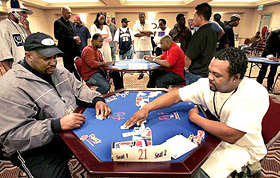 |
 |
 |
 News from Around the Americas | February 2006 News from Around the Americas | February 2006  
Domino Theory? No, This Is Real
 Lisa Richardson - LATimes Lisa Richardson - LATimes


| | Spectators watch competitors at the Professional Domino Assn. tournament at the Los Angeles Airport Hilton. (Carlos Chavez/LAT) |
Take an NFL touchdown celebration, add some world-wresting braggadocio and a dash of hip-hop bravado, and there you have the atmosphere at the Professional Domino Assn. kickoff tournament Saturday in Los Angeles.

Facing off in pairs were 70 of what had to be the most confident people in America. Good-natured trash was talked, reputations made, egos deflated and champions unseated as the tiles were slammed to the tables with in-your-face triumph and spectacular bluffing.

Saturday's was the first tournament in a 12-city tour set up by the association, each with a $30,000 purse. The association, the brainchild of former music executive Jay King, aims to turn one of the world's most popular games from a picnic-and-party pastime into a high-stakes spectator sport. King, the association commissioner, is calculating that his events will do for dominoes what televised tournaments have done for poker.

ESPN Deportes, the Spanish-speaking arm of the network, is counting on it. The network is confident that it can create international interest in the game.

"We want to give it a national platform and beyond," said Lino Garcia, general manager of ESPN Deportes. "We think it could be a real groundswell start on the Spanish-language side and then catch fire. We did it for poker, and we think we can do it for dominoes too."

Dressed in a dark suit, King prowled between the tables at the Los Angeles Airport Hilton on Saturday, arranging the division match-ups, settling disputes and celebrating with the winners. The only drawback to the endeavor, he said, is that he cannot play in his own tournaments.

"I'm the greatest dominoes player to play the game," he said. "It would be like giving myself money."

King plays dominoes every day. Sometimes he does not leave his Northridge home at all or get out of his pajamas before competitors show up for a match.

He is not alone. Ask any sampling of players at the tournament what they did yesterday and the day before: It was dominoes and dominoes.

When he's not playing, Corey Triggs of Sacramento said he works as a carpenter. "But I do have a life," he said as his domino buddies nodded in agreement. "Sometimes we'll all stop playing, leave the house and go get something to eat. Then we can pull out the dominoes, like at Denny's, and play while we're eating."

Dominoes is played with tiles marked with zero to 12 dots. Players score when the total of all dots on the ends of the rows add up to five or multiples of five. At this tournament, the first to reach 150 points won the game.

At the professional level, dominoes is different. Play is rapid, and unless opponents are truly matched in skill and luck, the games tend to end quickly.

Real players are great bluffers, whether trash-talking or not.

Nate Tsegay, 31, ranked No. 1 by the association, keeps a poker face when he plays, is careful not to gesture and definitely does not talk. It is intimidation through silence.

"I can tell it bothers some people because they just get louder and louder," he said. "But good players can tell what you've got by the way you cross your arms or even move around, so I don't do anything."

As the day wore on and living-room players fell out of competition, games became quieter. Early on, however, it was a different story.

Typical conversations went like this:

"You! You're here today? I didn't think you'd be here. Oh, man, have you learned how to play yet?"

Or this: "Jay King the best? Jay said he was the best? Well, he's been wrong before, it's no surprise that he's wrong again now."

Sometimes, winners showed compassion.

"Man, it's going to be OK," said Samuel McNeal, kindly, to Jeffrey Davis of Pasadena, who lost in the first round.

Davis learned the hard way that the older players, many with decades more experience, were ferocious competitors.

But McNeal couldn't help himself. "Downstairs," he deadpanned, "they've set up some counseling for you
. "

Everyone nearby burst into laughter.

"See, part of the game is talk," said Travis Newsome of Missouri. Newsome was part of an eight-man team called the Kansas City "Show Me" Domino Dominators. "I try to play a sophisticated game, but at a high level, when the skills are so even, we have to get the game off the table and into the head."

That's comedian and radio personality Rodney Perry's approach.

"Congratulations, you get to play me," Perry announced as he sat down at top-ranked Tsegay's table. "They say he's the champ?" he yelled to the room at large. "But he hasn't beat me, so I'm the champ right now!"

Tsegay, a youth minister from the Bay Area, shook hands, wished Perry luck and never spoke again. He won the first game in just under four minutes. He won the second, for two out of three, after that.

Tsegay was later upset by 39-year-old Tim Watson, an ironworker from the Bay Area.

Watson and Jamar Cannon of Oakland faced each other in the final round, which stretched into the night. The victor was to earn $10,000. | 
 | |
 |



